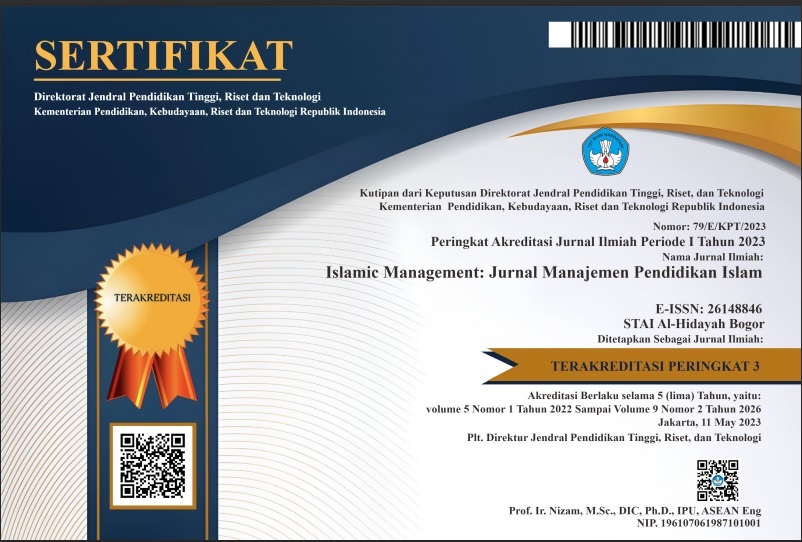WORK STRESS MANAGEMENT AND WORK MOTIVATION IN ISLAMIC PERSPECTIVE
DOI:
https://doi.org/10.30868/im.v8i02.8192Keywords:
Stress Management, Work Motivation, Islamic PerspectiveAbstract
Work stress and work motivation are two factors that greatly influence individual performance in the work environment. From an Islamic perspective, work stress can be managed through a spiritual approach, such as tawakal, sabar, and sholat, which function as coping mechanisms to overcome work pressure. Meanwhile, work motivation in Islam is not only oriented towards material things but also on the intention to seek Allah's pleasure (ikhlas) and work as a form of worship. This study aims to analyze the concept of work stress management and work motivation from an Islamic perspective and how to implement it in professional life. The research method used is library research by analyzing Islamic literature, including the Qur'an, Hadith, and the views of related scholars. The results of the study indicate that work stress management in Islam emphasizes a balance between worldly endeavors and spirituality, such as maintaining physical and mental health and strengthening relationships with Allah. Meanwhile, work motivation based on Islamic values can improve work ethic and more meaningful job satisfaction. The application of stress management and work motivation from an Islamic perspective can be an effective solution in creating a healthy and productive work environment.
References
Alfian, Azyyati Ridha, Rosidah Zahrah, Putri Nilam Sari, and Nizwardi Azkha. 2021. “Analisis Manajemen Stres Kerja Pada Pengajar Sekolah Luar Biasa (SLB) Negeri 1 Padang Tahun 2020.” MEDIA KESEHATAN MASYARAKAT INDONESIA 20 (4). https://doi.org/10.14710/mkmi.20.4.275-282.
Angwen, Dea Gitta. 2017. “HUBUNGAN ANTARA LINGKUNGAN FISIK DAN BEBAN KERJA DENGAN STRES KERJA PADA PT PANGGUNG ELECTRIC CITRABUANA.” Ilmiah 6.
Bhat, Ali Muhammad. 2016. “Human Psychology (Fitrah) from Islamic Perspective.” International Journal of Nusantara Islam 4 (2). https://doi.org/10.15575/ijni.v4i2.1187.
Daulay, Maslina. 2021. “Implementasi Bimbingan Konseling Islam Dalam Stres.” Jurnal Al-Irsyad: Jurnal Bimbingan Konseling Islam 3 (2). https://doi.org/10.24952/bki.v3i2.4875.
Farkas, Kathleen J. 2022. “The Routledge Handbook of Social Work and Addictive Behaviors.” Journal of Social Work Practice in the Addictions 22 (2). https://doi.org/10.1080/1533256x.2022.2051898.
Fazal, Fathima Azra, and Rupak Chakravarty. 2021. “Researcher Development Models and Library Research Support.” Library Hi Tech News. https://doi.org/10.1108/LHTN-04-2021-0015.
Hamzah, Amir. 2020. “Metode Penelitian Kepustakaan (Library Research).” Literasi Nusantara Abadi 5 (1).
Indrayana, David Shandika, and Febrianur Ibnu Fitroh Sukono Putra. 2024. “Pengaruh Beban Kerja, Stres Kerja Dan Lingkungan Kerja Terhadap Kinerja Karyawan.” Jurnal Ilmu Ekonomi, Manajemen Dan Bisnis 2 (1). https://doi.org/10.30787/jiembi.v2i1.1407.
Julaeha, Eha. 2019. “Peran Pembimbing Konseling Islam Dalam Menangulangi Konflik, Stres, Trauma Dan Frustrasi.” Prophetic : Professional, Empathy and Islamic Counseling Journal 2 (1). https://doi.org/10.24235/prophetic.v2i1.4754.
Kementerian Agama. 2020. “Qur’an Kemenag.” Lajnah Pentashihan Mushaf Al-Qur’an.
Madyaningrum, Monica Eviandaru. 2022. “Psikologi Dan Kehendak Untuk Memperbaiki.” Suksma: Jurnal Psikologi Universitas Sanata Dharma 3 (1). https://doi.org/10.24071/suksma.v3i1.4957.
Maharani, Herdiana Candrika, and Andrian Pramadi. 2021. “Penyuluhan Manajemen Stres Dan Teknik Relaksasi Pada Komunitas Rumah Singgah.” KELUWIH: Jurnal Sosial Dan Humaniora 2 (1). https://doi.org/10.24123/soshum.v2i1.3960.
Marín, Mayra, Yuri Rodríguez, Eloy Gamboa, Jorge Ríos, José Rosas, and Frank Mayta-Tovalino. 2019. “Level of Work Stress and Factors Associated with Bruxism in the Military Crew of the Peruvian Air Force.” Medical Journal Armed Forces India 75 (3). https://doi.org/10.1016/j.mjafi.2019.01.001.
Nasib Tua Lumban Gaol. 2016. “Teori Stres: Stimulus, Respons, Dan Transaksional.” Buletin Psikologi 24 (1).
NCT04739696. 2021. “Developing a Virtual Stress Management Intervention for Spousal/Partnered Caregivers of Solid Tumor Cancer Patients.” Https://Clinicaltrials.Gov/Ct2/Show/NCT04739696.
Nurdiawati, Ela, and Nina Atiatunnisa. 2018. “Hubungan Stres Kerja Fisiologis, Stres Kerja Psikologis Dan Stres Kerja Perilaku Dengan Kinerja Karyawan.” Faletehan Health Journal 5 (3). https://doi.org/10.33746/fhj.v5i3.24.
Safitri, Hety Umriyani. 2020. “Hubungan Beban Kerja Dengan Stres Kerja.” Psikoborneo: Jurnal Ilmiah Psikologi 8 (2). https://doi.org/10.30872/psikoborneo.v8i2.4897.
Steven, Hartono Jessie, and Arif Partono Prasetio. 2020. “Pengaruh Stres Kerja Dan Kepuasan Kerja Terhadap Kinerja Karyawan.” Jurnal Penelitian IPTEKS 5 (1). https://doi.org/10.32528/ipteks.v5i1.3022.
Widyatmoko, Widyatmoko. 2023. “Efektivitas Manajemen Stress Digital Dalam Mengatasi Dampak Penggunaan Teknologi Informasi.” Serat Acitya 12 (2). https://doi.org/10.56444/sa.v12i2.1170.
Yovi, Efi Yuliati. 2019. “Status Ergonomi Pekerja Sektor Kehutanan Di Indonesia: Kelelahan Fisik-Mental-Sosial, Kepuasan Kerja, Konsep Sumber Bahaya, Dan Konsep Biaya Kecelakaan.” Jurnal Ilmu Kehutanan 13 (2). https://doi.org/10.22146/jik.52140.
Downloads
Published
How to Cite
Issue
Section
Citation Check
License
Copyright (c) 2025 Atabik Luthfi, Syahrullah Syahrullah, Hardjadinata Hardjadinata, Deden Edi, Fajar Harguna Endra Putra

This work is licensed under a Creative Commons Attribution-ShareAlike 4.0 International License.
Authors who publish with this journal agree to the following terms:
- Authors retain copyright and grant the journal right of first publication with the work simultaneously licensed under a Creative Commons Attribution License that allows others to share the work with an acknowledgment of the work's authorship and initial publication in this journal.
- Authors are able to enter into separate, additional contractual arrangements for the non-exclusive distribution of the journal's published version of the work (e.g., post it to an institutional repository or publish it in a book), with an acknowledgment of its initial publication in this journal.
- Authors are permitted and encouraged to post their work online (e.g., in institutional repositories or on their website) prior to and during the submission process, as it can lead to productive exchanges, as well as earlier and greater citation of published work (See The Effect of Open Access).






